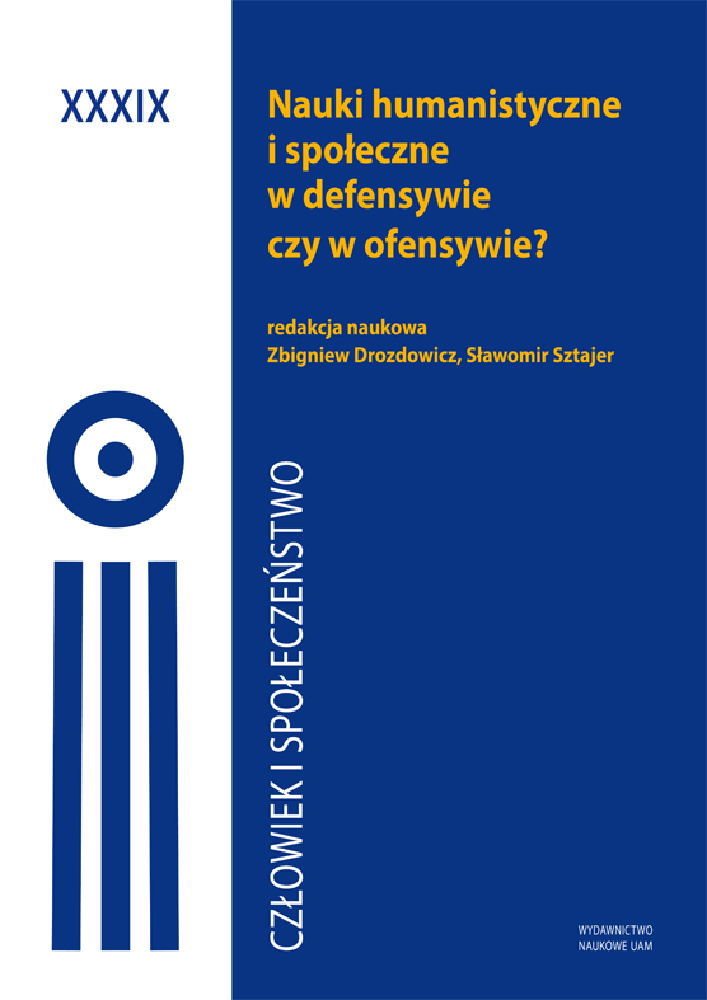Abstrakt
Ideology is often perceived as an impediment to advancing the scientific study of religion. The rhetoric of scientificity, which is present in many academic publications in religious studies, seems to conceal a fear of a marriage between science and ideology. The article argues that it is neither possible nor necessary to build religious studies freed from ideological influences. It is not entirely possible because no researcher can isolate herself from ideological factors which are a result of his participation in social life. But it is also not necessary because one can conduct careful and rigorous research in some ideological frameworks. There are situations in which the ideological factor can play a considerable and positive role. What is import_ant, however, is to develop an unceasing critique of ideological influences which aims at uncovering and then controlling them both on the scientific and institutional plane.
Bibliografia
Anttonen V., Pathways to Knowledge in Comparative Religion: Clearing Ground for New Conceptual Resources, w: E.T. Lawson, T. Light, B.C. Wilson (red.), Religion as a Human Capacity, Brill, Leiden 2004.
Barnes B., Interests and the Growth of Knowledge, Routledge – Kegan Paul, London 1978.
Bronk A., Czym jest religiologia?, „Nauka” 2/2011.
Bronk A., Nauka wobec religii, TN KUL, Lublin 1996.
Dean W., Religious Critic in American Culture, Suny, Albany 1994.
Drozdowicz Z., Czym było i jest religioznawstwo, „Nauka” 3/2011.
Eagleton T., Ideology: An Introduction, Verso, London – New York 1991.
Eliade M., W poszukiwaniu historii i znaczenia religii, KR, Warszawa 1997.
Fitzgerald T., Ideology of Religious Studies, Oxford University Press, New York – Oxford 2000.
Giddens A., Nowoczesność i tożsamość: „Ja” i społeczeństwo w epoce późnej nowoczesności, Wyd. Naukowe PWN, Warszawa 2001.
Guidelines for Teaching About Religion, in K-12 Public Schools in the United States, American Academy of Religion, 2006.
Habermas J., Interesy konstytuujące poznanie, „Colloquia Communia” 2/1985.
Jensen T., Rothstein M., Preface, w: T. Jensen, M. Rothstein (red.), Secular Theories on Religion: Current Perspectives, Museum Tusculanum Press, Copenhagen 2000.
Martin L.H., Wiebe D., Religious Studies as a Scientific Discipline: The Persistence of a Delusion, „Journal of the American Academy of Religion” 3/2012.
McCutcheon R.T., A Default of Critical Intelli-gence? The Scholar of Religion as Public
Intellectual, „Journal of the American Academia of Religion” 2/1997.
Skrzypek M., Oświecenie francuskie a początki religioznawstwa, Zakład Narodowy im. Ossolińskich, Wrocław 1989.
Turner L., Introduction: Pluralism and Complexity in the Evolutionary Cognitive Science of Religion, w: F. Watts, L. Turner (red.), Evolution, Religion and Cognitive Science: Critical and Constructive Essays, Oxford University Press, Oxford 2014.
Wiebe D., The Politics of Wishful Thinking? Disentangling the Role of the Scholar-Scientist from that of the Public Intellectual in the Modern Academic Study of Religion, „Temenos” 41(1)/2005.
Willaime J.-P., Different Models for Religion and Education in Europe, w: R. Jackson, S. Miedema, W. Weisse, J.-P. Willaime (red.), Religion and Education in Europe: Developments, Contexts and Debates, Waxmann, Münster 2007.
Zdybicka Z., Człowiek i religia, TN KUL, Lublin 1993.
Licencja
1. W momencie złożenia pracy celem rozpoczęcia postępowania w sprawie publikacji, Licencjodawca, zwany dalej Autorem, akceptuje wszystkie zasady umieszczone na stronie internetowej czasopisma “Człowiek i Społeczeństwo”, udzielając Licencjobiorcy, zwanego dalej Wydawcą, niewyłącznej i nieodpłatnej licencji na korzystanie z Utworu. Licencja zakłada tym samym brak ograniczeń terytorialnych, czasowych oraz ilościowych na następujących polach eksploatacji (art. 50 ustawy z dnia 4 lutego 1994 r. o prawie autorskim i prawach pokrewnych):
a. utrwalanie Utworu;
b. zwielokrotnienie Utworu drukiem i w wersji cyfrowej;
c. wprowadzenie do obrotu, użyczenie lub najem oryginału/zwielokrotnionych egzemplarzy Utworu;
d. publiczne wykonanie, wystawienie, wyświetlenie, odtworzenie oraz nadawanie i reemitowanie, a także publiczne udostępnianie Utworu w taki sposób, aby każdy mógł mieć do niego dostęp w miejscu i w czasie przez siebie wybranym;
e. włączenie Utworu w skład utworu zbiorowego;
f. wprowadzenie Utworu w postaci elektronicznej na platformy elektroniczne lub inne wprowadzenie Utworu w postaci elektronicznej do Internetu, Intranetu, Extranetu lub innej sieci;
g. rozpowszechnianie Utworu w wersji elektronicznej w Internecie, Intranecie, Extranecie lub innej sieci, w pracy zbiorowej, a także samodzielnie w formule Open Access w oparciu o licencję Creative Commons Uznanie autorstwa 4.0 Międzynarodowa Licencja Publiczna (CC BY 4.0), a także inną wersję językową tej licencji, lub którąkolwiek późniejszą wersję tej licencji.
2. Założenia licencji Creative Commons Uznanie autorstwa 4.0 Międzynarodowa Licencja Publiczna (CC BY 4.0), udzielają Wydawcy upoważnienia do kopiowania, zmieniania, rozprowadzania, przedstawiania i wykonywania Utworu jedynie pod warunkiem uznania autorstwa.
3. Wraz z dostarczeniem Utworu, Autor zobowiązuje się do wypełnienia, podpisania oraz odesłania skanu umowy
